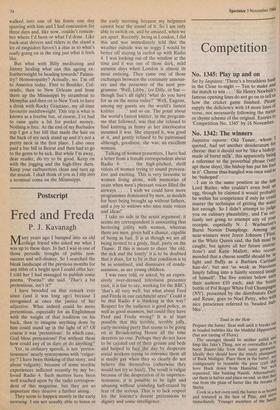Postscript
Fred and Freda
P. J. Kavanagh many years ago I bumped into an old college friend who asked me what I was up to these days. In fact I was in one of those periodic troughs of public non- success and self-dismay. So I searched the bleak landscape of the previous months for any titbit of a bright spot I could offer her: I told her I had managed to publish some poems. 'Poems?' she said. 'That's a bit pretentious, isn't it?'
I have brooded on that remark ever since (and it was long ago) because I recognised at once the justice of her adjective. What indeed could be more pretentious, especially for an Englishman with the weight of that tradition on his back, than to imagine anything done by him could stand up in the light of it? Of course it was 'pretentious'. In which case, God bless pretensions! For without them how could any of us dare or do anything?
Yet, in ordinary speech, is not 'preten- tiousness' nearly synonymous with 'vulgar- ity'? I have been thinking of that story, and about vulgarity, because of some terrible experiences inflicted recently by my be- loved Radio 4. Such matters have been well touched upon by the radio correspon- dent of this magazine, but they are so important they deserve a further airing.
They seem to happen mostly in the early morning. I am not usually able to listen in the early morning because my helpmeet cannot bear the sound of it. So I am only able to switch on, and be amazed, when we are apart. Recently, being in London, I did this and was immediately told that the weather outside was so soggy I would be better off staying in curled up with Radio 4. I was looking out of the window at the time and it was one of those dark, mild autumn days when London is almost its most enticing. Then came one of those exchanges between the continuity announ- cer and the presenter of the next pro- gramme. 'Well, Libby,' (or Dilly, or Sue though Sue's all right) 'what do you have for us on the menu today?"Well, Eugene, among my guests are the world's fastest knitter . . . .' and so on. The point about the world's fastest knitter, in the program- me that followed, was that she refused to find knitting as funny as her interlocutor assumed it was. She enjoyed it, was good at it, and gently refused to be patronised although, goodness, she was; an excellent woman.
Talking of women presenters, I have had a letter from a female correspondent about Radio 4: . the high-pitched, shrill voices of women trying to sound provoca- tive and exciting. This is very tiresome to women living alone, with memories of years when men's pleasant voices filled the airways . . . . I wish we could have more programmes dominated by men, as models for boys being brought up without fathers, and a joy to widows who miss male voices and ideas!'
I take no side in the sexist argument; it seems my correspondent is associating that hectoring jollity with women, whereas there are men, given half a chance, capable of being as bad. It is as though we are all being invited to a grisly, final, party on the Titanic. If this is meant to cheer 'the old, the sick and the lonely' it is to be doubted that it does, for to be in that condition is to be as sensitised, and dismissive of conde- scension, as are young children.
I was once told, or asked, by an expen- sively over-dressed television presenter (not, it is fair to say, working for the BBC) 'that's all very well, but what about Fred and Freda in our catchment area!' Could it be that Radio 4 is thinking in this way? Respect for the audience is good policy, as well as good manners, but could they have Fred and Freda wrong? It is at least possible that this terrible, terribly jolly, early-morning party that seems to be going on at Broadcasting House all the time deceives no one. Perhaps they do not have to be cajoled out of their groans and beds and helped to face the day by desperate social workers trying to convince them all is madly gay when they so clearly do not believe this themselves (otherwise they would not try so hard). The result is vulgar because of the desperation of its unpreten- tiousness; it is possible to be light and amusing without sounding half-crazed by fear of the serious. That is to lack respect for the listener's decent pretensions to dignity and some intelligence.










































 Previous page
Previous page